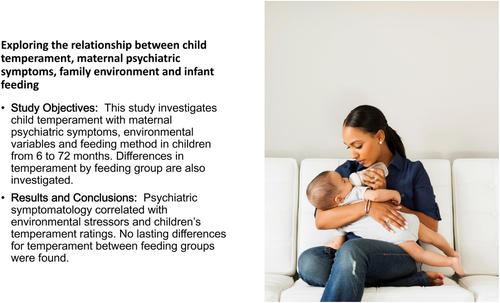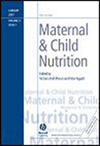Exploring the relationship between child temperament, maternal psychiatric symptoms, family environment and infant feeding
Abstract
Objectives
Infant temperament is assumed to be primarily innate. However, newer research suggests that maternal affection impacts ratings of temperament and environmental factors, including feeding method, can also influence infant temperament. This study investigates child temperament and its relationships with maternal psychiatric symptoms, environmental variables and feeding method longitudinally in a cohort of children followed from 6 to 72 months. Differences in temperament by feeding group are also investigated. We hypothesized that maternal psychiatric symptoms, environmental stressors, and impaired family dynamics would have negative impact on child temperament, whereas breastfeeding would have a positive impact on child temperament.
Method
Mothers' ratings of child's temperament, own psychiatric symptomatology, environmental stresses and family cohesion were obtained in 504 mother-infant dyads via rating scales completed by mothers. Infants were breastfeed (BF), fed soy-based infant formula (SF) or dairy-based infant formula (MF). Linear mixed effect models investigated the relationship of variables on child's temperament while controlling for significant covariates and repeated measurements.
Results
Mothers in this study did not endorse clinical-level psychiatric symptomatology; however, when adjusted for significant covariates, higher psychiatric symptomatology significantly correlated with environmental stressors, impaired family dynamics and elevations in temperament ratings of infants' adaptability and mood. There were no lasting differences for temperament between feeding groups. However, some significant transient increases in rhythmicity and adaptability were found between SF and BF children.
Conclusion
Positive relationships between family environment stressors and maternal psychiatric ratings were found. Transient differences were found in child temperament based upon feeding method.



 求助内容:
求助内容: 应助结果提醒方式:
应助结果提醒方式:


